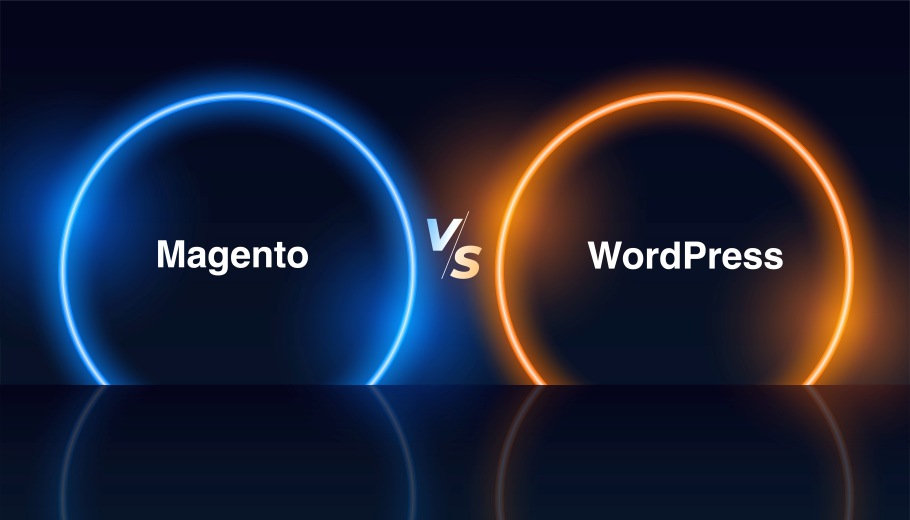When it comes to building an online eCommerce store, businesses have several options to choose from. However, two platforms that stand out among the rest are Magento and WordPress. Both platforms offer robust features, customization options, and functionality to build a successful online store.
Both Magento and WordPress are powerful and feature-rich Content Management Systems (CMS), but which is right for your needs? From customization options to eCommerce capabilities, we’ll cover everything you need to make an informed choice.
So, whether you’re an entrepreneur looking to launch an online store or a blogger seeking a user-friendly platform, this guide will help you navigate the world of Content Management Systems and choose the one that best suits your needs.
What Is Magento?
The Magento platform is a popular open-source e-commerce platform designed for businesses of all sizes. It was launched in 2008 and acquired by Adobe in 2018. Magento offers a range of e-commerce features for online merchants, including catalog management, payment and shipping options, customer segmentation, and marketing tools. It is highly customizable and flexible, making it an ideal choice for businesses with complex e-commerce needs.
Magento is available in two editions: Magento Open Source (formerly known as Community Edition) and Magento Commerce (formerly known as Enterprise Edition). While Magento Open Source is free and can be downloaded and installed, Magento Commerce is a paid solution that offers additional features and support.
Magento is designed mostly for web developers’ businesses that need a powerful eCommerce platform with advanced features and customization options. It is a complex system that requires technical expertise to set up, maintain, and customize.
While Magento offers a lot of flexibility and control, it can also be overwhelming for beginners. However, with the right team of developers and designers, Magento can be customized to fit almost any business need.
What Is WordPress?
Whether you want to build a website for your startup, your local business, launch an e-commerce store or a side project, WP can be a great solution. WordPress is a popular open-source CMS that powers over 43% of all websites on the internet. It was first released in 2003 and has since grown into a robust platform with a large community of developers and users.
WordPress is known for its ease of use, flexibility, and customizability. It offers a range of eCommerce features for bloggers, businesses, and eCommerce websites, including themes, plugins, and WordPress blogs for writers.
WordPress is available in two versions: WordPress.com and WordPress.org. While WordPress.com is a hosted solution that offers limited customization options, WordPress.org is a self-hosted solution that gives users full control over their website.
WordPress users range from plain beginners to amateurs and experts. It is easy to use and set up, making it an ideal choice for bloggers, small businesses, and non-technical users. While WordPress is primarily a blogging platform, it can also be used to create eCommerce websites and other complex web applications. WordPress offers a range of plugins and themes that can be used to add functionality and customize the design of your website.
Comparison Of Magento And WordPress
Now that we’ve covered the basics of Magento and WordPress, let’s compare the two platforms based on seven key factors: customization, eCommerce capabilities, security, scalability, cost, user-friendliness, and support.
1. Customization
Magento is highly customizable and flexible, making it an ideal choice for businesses with complex eCommerce needs. It offers a range of customization options for design, functionality, and integrations. A large library of Magento extensions and themes is provided that can be used to add features and customize the look and feel of your website.
However, Magento customization can be complex and requires technical expertise. And while a majority of the Magento admin is committed to enhancing eCommerce functionality, not much importance is laid on content marketing.
WordPress is also highly customizable and flexible, with a large library of themes and plugins that can be used to add functionality and customize the design of your website. WordPress themes are easy to install and customize, and there are thousands of free and paid options available.
WordPress plugins can be used to add almost any feature to your website, from social media integration to eCommerce functionality. However, WordPress customization is not as complex as Magento and can be done without technical expertise.
2. eCommerce Capabilities
Magento is designed for eCommerce and offers a range of features for online merchants, including catalog management, payment, website performance optimization and shipping options, customer segmentation, and marketing tools.
Magento offers a range of payment and shipping integrations and supports multiple currencies and languages. Magento is also highly scalable and can handle large volumes of traffic and transactions. However, Magento can be complex to set up and requires technical expertise.
WordPress is not primarily designed for eCommerce but can be used to create online stores using plugins like WooCommerce. WooCommerce is a popular eCommerce plugin for WordPress that offers a range of features for online merchants, including product management, payment and shipping options, customer segmentation, and marketing tools.
WooCommerce is easy to set up and use, making it an ideal choice for small businesses and beginners. However, WooCommerce is not as powerful as Magento and may not be suitable for businesses with complex eCommerce needs.
Wondering whether Magento or WordPress is the perfect platform to fuel your online success?
Contact Growth Hackers
3. Security
Magento is known for its strong security features and is designed to protect online stores from security threats. Magento offers a range of security features, including secure payment and shipping options, SSL encryption, two-factor authentication, and regular security updates. However, Magento security can be complex and requires technical expertise to set up and maintain.
WordPress is also known for its strong security features and is designed to protect websites from security threats. WordPress offers a range of security features, including SSL encryption, two-factor authentication, and regular security updates.
WordPress security can be enhanced using plugins like Wordfence and Sucuri, which offer additional security features. However, WordPress security can be compromised if not updated regularly or if weak passwords are used.
4. Scalability
Magento is highly scalable and can handle large volumes of traffic and transactions. Magento is designed to handle complex eCommerce needs and can be customized to fit almost any business need. However, Magento can be complex to set up and requires technical expertise to scale.
WordPress is also highly scalable and can handle large volumes of traffic and transactions. WordPress can be used to create websites of any size, from small blogs to large eCommerce stores. However, WordPress scalability can be compromised if not optimized properly or if weak hosting is used.
5. Cost
Magento Open Source is free and can be downloaded and installed, making it an ideal choice for businesses on a budget. However, Magento Commerce is a paid solution that offers additional features and support. Magento Commerce pricing starts at $1,988 per month, making it a more expensive option than WordPress.
WordPress is free and open-source, making it an ideal choice for businesses on a budget. However, there are additional costs associated with using WordPress, such as hosting, themes, and plugins. While there are many free options available, premium themes and plugins can be expensive.
6. User-Friendliness
Magento is a complex system that requires technical expertise to set up, maintain, and customize. While Magento offers a lot of flexibility and control, it can also be overwhelming for beginners. However, with the right team of developers and designers, Magento can be customized to fit almost any business need.
WordPress is known for its ease of use, flexibility, and customizability. It is easy to set up and use, making it an ideal choice for beginners and non-technical users. While WordPress is primarily a blogging platform, it can also be used to create eCommerce websites and other complex web applications.
7. Support
The Magento marketplace offers a range of support options, including community forums, documentation, and paid support plans. Magento also has a large community of developers and users who can provide support and guidance. However, Magento support can be expensive and may require technical expertise.
WordPress has a large and active community of developers and users who can provide support and guidance. WordPress also offers documentation and community forums for support. However, WordPress support can be limited for complex issues and may require technical expertise.
8. Performance and Speed
Magento’s performance and speed depend on several factors, such as server configuration, database optimization, and caching. Magento requires a powerful server to handle large e-commerce websites, and it can be slow if not optimized correctly.
On the other hand, WordPress is known for its speed, superior website experience and performance. It is a lightweight platform that loads quickly, and its performance can be improved with plugins such as caching and optimization plugins.
Magento Vs WordPress – Search Engine Optimization Selection
Both Magento and WordPress offer unique pros and cons when it comes to SEO. Magento offers robust SEO features, customization options, and scalability, making it an ideal platform for large eCommerce websites. However, technical expertise is required to set up and manage, which can add to the overall cost of running an online Magento store.
WordPress is known for its user-friendliness, ease of use, and SEO plugins. It is an ideal platform for small to medium-sized businesses that are looking to build an online store. However, WordPress offers limited customization options compared to Magento.
The selection depends on your business’s needs and requirements. If you are a large eCommerce business that requires a high level of customization and scalability, Magento may be the best platform for you. However, if you are a small to medium-sized business that requires user-friendliness and ease of use, a WordPress site may be the best option for you.
Magento Vs WordPress: Pros & Cons
Magento: Pros
- Advanced Features
Magento offers a wide range of features, including advanced product management, multi-store management, and integrated payment options. These features make it a better option for large businesses with complex needs.
- Customization
Magento offers more customization options than WordPress, allowing businesses to create a unique and personalized e-commerce site.
- Scalability
Magento is highly scalable, making it a better fit for businesses that anticipate growth in the future.
Magento: Cons
- Complexity
Magento is a complex platform that requires a high level of technical expertise to operate. This makes it a less suitable option for businesses that don’t have an experienced development team.
- Cost
Magento is a more expensive platform to operate than WordPress. Businesses that choose Magento will need to pay for development, hosting, and maintenance costs.
- Performance
Magento can be slower than WordPress if not optimized correctly. This can result in a poor user experience and lower search engine rankings.
WordPress: Pros
- User-Friendly
WordPress is a user-friendly platform that is easy to use and navigate. This makes it a better option for businesses that don’t have experience with web development.
- Cost-Effective
WordPress is a cost-effective platform to operate, and businesses can save on development and maintenance costs.
- Plugins
WordPress has a wide range of plugins that allow businesses to add advanced functionality to their e-commerce site.
WordPress: Cons
- Limited Customization
WordPress offers fewer customization options than Magento, making it a less suitable option for businesses that require advanced functionality.
- Scalability
WordPress can be less scalable than Magento, making it a less suitable option for businesses that anticipate growth in the future.
- Security
WordPress is a popular platform, which makes it a frequent target for hackers. Businesses that choose WordPress will need to ensure that their site is secure to avoid security breaches.
Choose the right CMS for your website to elevate your online presence today!
Tips For Optimizing Your E-commerce Site On Magento Or WordPress
Optimizing your e-commerce site can have numerous benefits for your business. For starters, it can improve your search engine rankings, making it easier for potential customers to find your site. This can lead to more traffic, which can translate into more sales. Here are some tips for optimizing your e-commerce site on Magento or WordPress:
Use A Fast, Reliable Hosting Service
Site speed and performance are critical factors in e-commerce success. Customers expect fast, smooth-loading sites and slow page load times can result in higher bounce rates and lower conversion rates.
Optimize Images
Large images and files can slow down your site’s load times. By minimizing file sizes, you can improve your site’s speed and performance.
Use A CDN
A CDN can help reduce load times by distributing your site’s content across multiple servers. This can help improve site performance, especially for visitors in different geographic locations.
Optimize For Mobile
Ensure your e-commerce site is optimized for mobile devices to improve user experience and search engine rankings.
Leverage Social Media And Email Marketing
Social media and email marketing can be powerful tools for driving traffic and increasing sales on your e-commerce site. To leverage these channels effectively, you can take several steps, including creating engaging social media content or running targeted social media ads.
Track And Analyze Site Data
To effectively optimize your e-commerce site, it’s important to track and analyze site data. This can include data on site traffic, user behavior, conversion rates, and more. By tracking and analyzing site traffic and user behavior, you can identify areas for improvement and make data-driven decisions.
Magento And WordPress SEO Success Stories
Let’s take a look at some case studies of Magento and WordPress websites that have achieved SEO success.
Magento Success Story
One of the most notable Magento store success stories is the website of the luxury fashion brand, Christian Louboutin. The website uses Magento and has achieved significant SEO success. The website ranks highly for several keywords related to the brand, and its SEO strategy has resulted in increased traffic and sales.
WordPress Success Story
One of the most successful WordPress websites is the website of the popular travel blog, Nomadic Matt. The website uses WordPress and has achieved significant SEO success. The website ranks highly for several travel-related keywords, and its SEO strategy has resulted in increased traffic and revenue.
Final Thoughts On Magento Vs WordPress
When it comes to building an online store, choosing the right platform is critical for your business’s success. Both Magento and WordPress offer unique pros and cons when it comes to SEO. Magento offers robust SEO features, customization options, and scalability, making it an ideal platform for large e-commerce websites. However, Magento requires technical expertise to set up and manage, which can add to the overall cost of running an online store.
WordPress is known for its user-friendliness, ease of use, and SEO plugins. It is an ideal platform for small to medium-sized businesses that are looking to build an online store. However, WordPress offers limited customization options compared to Magento.
So, which platform reigns supreme for SEO? The answer depends on your business’s needs and requirements. If you are a large e-commerce business that requires a high level of customization and scalability, Magento may be the best platform for you. However, if you are a small to medium-sized business that requires user-friendliness and ease of use, WordPress may be the best platform for you.
One can even follow the middle path – by combining WordPress and Magento. It is possible to use both by using Magento to create your online store and WordPress to create a WordPress Blog. This is another great way for drawing traffic towards your online store.
And speaking of drawing traffic to your online business, Growth Hackers know just the right tactics to keep you growing sustainably, faster & smarter. Indeed, we’re more than just a web design company, we offer a full suite of growth marketing services to help businesses grow, thrive and succeed.
At Growth Hackers, we understand that a digital marketing strategy that drives leads and sales is essential for any online business to achieve sustainable growth. We pride ourselves on using data-driven analysis and result-driven insights to craft marketing campaigns that deliver optimal ROI.
Our team of experts is experienced in identifying trends and patterns to uncover opportunities to make the most out of your marketing efforts. By partnering with us, you can expect relentless efforts to help your business succeed in the competitive digital landscape. Let Growth Hackers help you maximize your online presence and reach new heights.









